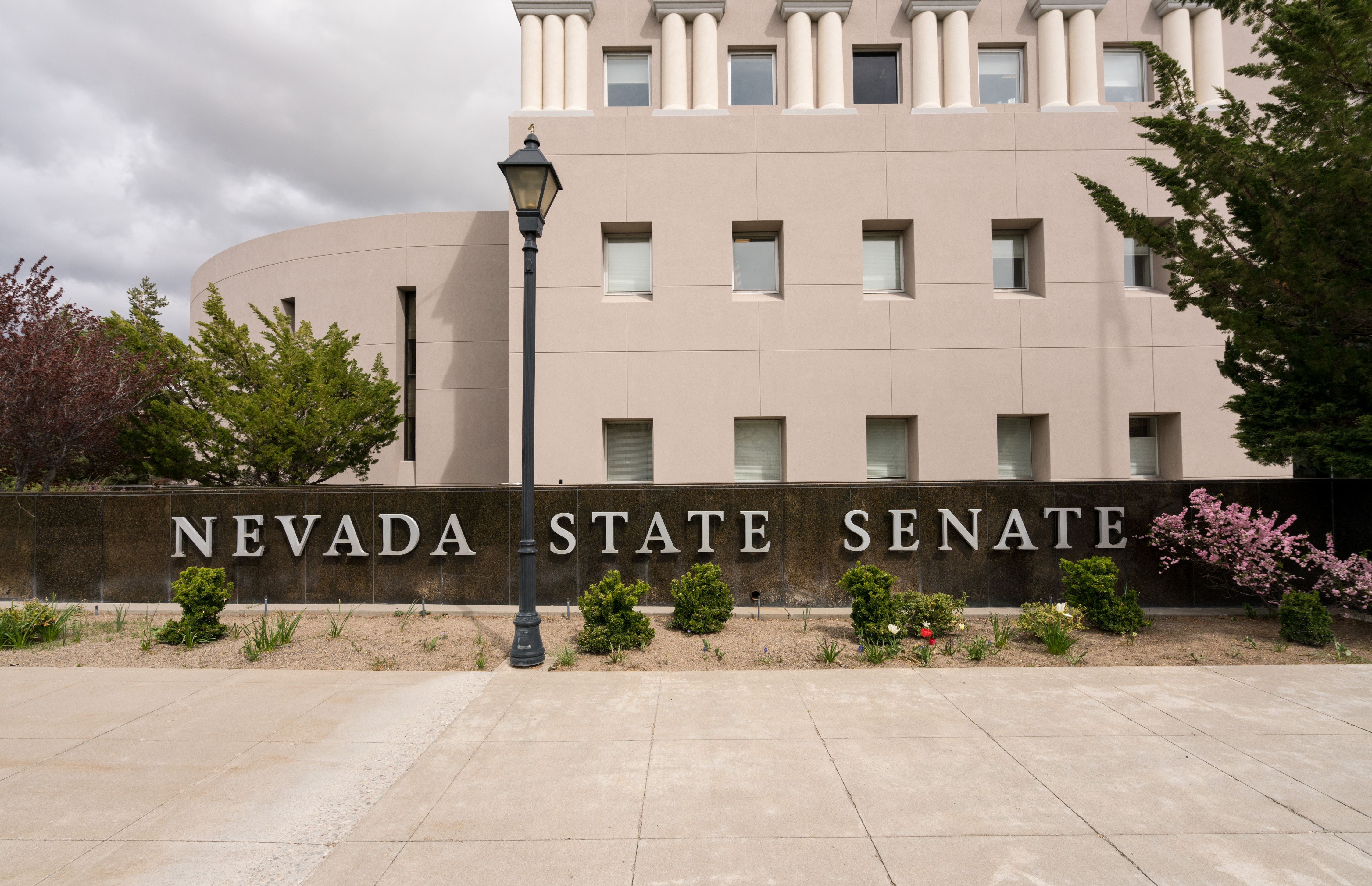By Dana Gentry, Nevada Current
This piece was originally published in the Nevada Current.
Legislation touted Tuesday by Gov. Joe Lombardo and law enforcement officials from Northern Nevada would turn back the clock on modest reforms passed by lawmakers with bipartisan support in 2019.
“This legislation was drafted to put teeth back into Nevada’s penal code, hold criminals accountable, empower judges and prosecutors and support victims of crime,” Lombardo said at a news conference Tuesday in front of the Carson City sheriff’s office.
The bill’s introduction comes on the heels of the revelation that the Nevada Department of Corrections has a $53 million budget deficit.
“I was convinced the Governor’s crime bill being released at the same time NDOC shockingly shared it paid $60m in overtime and predicted worse deficits in the near future was a joke, but it was apparently serious,” ACLU of Nevada Executive Director Athar Haseebullah said via email. “It’s incumbent on the Governor to share how he plans on paying for his relic-of-the-past crime bill.”
Last session, Lombardo spearheaded the Crime Reduction Act, which increased penalties for drug dealers, and limited early discharge from probation for gun violations.
“It’s evident that more work remains in our fight to secure our communities,” Lombardo said Tuesday.
Lombardo, on the campaign trail in 2022, blamed increases in crime on Assembly Bill 236, which was passed in 2019. His current legislation comes amid a reduction in a number of crime categories and increases in others. According to data from the State of Nevada, from 2023 to 2024:
- Property crime was down 12.37%
- Domestic violence was down 2.81%
- Violent crime was down 6%
- Crimes against the elderly were up 31.86%
- Hate crimes were up 88% from 2023, but down slightly from 2020
The legislation, Senate Bill 457, would enact multiple measures to toughen penalties and broaden the scope of infraction on the books.
“Historically, partisanship has prevented meaningful progress for public safety, but I am hopeful we can push past this session,” Lombardo said.
Lombardo’s Safe Streets and Neighborhoods Act would increase costs for the Nevada Department of Corrections by $3.6 million in the current biennium, by just under $7.2 million for the next biennium, and by $42.2 million in future biennium, according to a fiscal note.
“Much of the long-term increase is due to habitual criminal convictions with delayed effects,” NDOC wrote in the fiscal note. “For lesser sentences, this delay will take on average a year after implementation for an effect to begin.”
NDOC projects the reforms would add 38 offenders a year to the prison population, with an average incarceration of 6.5 years.
“For greater sentences, effects are expected to take up to 20 years to begin to materialize due to sizable average existing sentence lengths, even when the habitual criminal sentence is excluded,” according to NDOC. The department estimates 111 additional offenders would return in the first fiscal year after their release, increasing to 215 the next year.
“This increase is expected to continue until a plateau is reached at 632 additional offenders. The average total daily cost per offender in FY 2025 is $91.43,” NDOC notes.
Last week, NDOC director James Dzurenda testified the department is racking up $60 million in overtime a year because of the need to shift correction officers from one post to another to address staffing shortages, resulting in a $50 million dollar budgeting shortfall that took lawmakers by surprise.
“It’s the utmost importance to me to ensure that the law enforcement community has the tools in order to change the crime picture in our communities, and we will figure out a way through the government processes and all the available funding resources available to us to address those particular issues,” Lombardo said Tuesday, adding he is “evaluating time served for non-violent offenses” and projects a savings of $37 million a year as a result.
“Additionally, we will work through the existing bills that are going through the state process, and we can balance the budget to address this,” he said. “In my level of importance and triage we deal with in state government, nothing is as important…”
Haseebullah says Nevada’s district attorneys’ offices should disclose how much it will cost to prosecute the additional cases envisioned by Lombardo’s legislation.
The D.A.s, he says “have opposed record sealing bills for bullshit arrests that were dismissed with their opposition based on cost considerations, but magically, something like this is free for them.”
Lombardo’s legislation:
- Enacts tougher penalties for theft, burglary and for repeat offenders;
- Provides an additional penalty for offenders who commit new crimes while released from incarceration but are still under sentence;
- Allows separate charges for each sexual image of a person under the age of 16;
- Lowers the threshold for felony theft charges from $1200 to $750;.
- Imposes mandatory minimum sentences and increased penalties for trafficking large quantities of fentanyl;
- Eliminates diversion programs for offenders who victimize children, the elderly, and vulnerable adults;
- Imposes a sentencing enhancement for felonies committed by offenders on pre-trial release;
- Revises stalking crimes to include dating relationships, social media and other electronic means;
- Lowers the threshold of the number of felonies required for conviction as a habitual criminal;
- Expands marijuana and marijuana metabolite thresholds for intoxication;
- Increases penalties for DUI offenses resulting in death;
- Domestic batterers would be required to surrender their firearms;
- Increases burglary punishments, which were reduced in 2019;
- Extends the time for a bail hearing, set in 2021 at 24 hours, to 72 hours;
- Requires that any payments collected from a criminal defendant be first applied to pay restitution to the victim;
- Requires that any money collected from a defendant be used to satisfy restitution before it can be applied to court fines and fees;
- Ensures that a felony DUI offender who is in a diversion program will be subject to another felony for driving impaired;
- Increases the penalty range for DUI causing death to one to 20 years to five to 25 years;
- And allows DUI offenders to be charged in certain cases with second degree murder.
“Nevada has no money left to experiment on antiquated tough-on-crime policies which continue to devastate our budget and don’t make our community safer,” Haseebullah observed. “We’re about to face cuts statewide on basic services. I have no idea how anyone with any common sense would view this type of exorbitantly expensive regressive idea as a plus, but these types of performative messages seem to be the Nevada way.”
No hearing has been scheduled on the governor’s bill.
Date
Wednesday, April 9, 2025 - 12:00pmFeatured image

